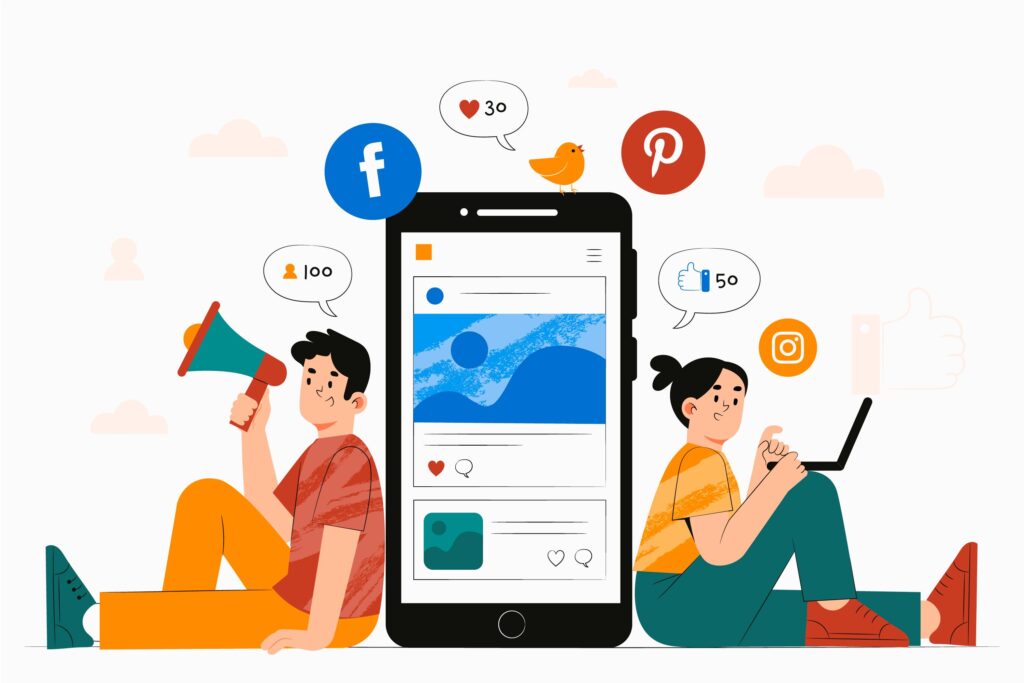In the digital age, social media has become a major player in shaping the way we approach weight loss. Platforms like Instagram, TikTok, and YouTube are flooded with fitness influencers, nutritionists, and personal trainers sharing their tips, workout routines, and diet plans. While this access to information can be a valuable resource, it also raises important questions about the reliability of these sources and how trends evolve from fleeting fads to sustainable, science-backed methods.
The Rise of Weight Loss Fads
Social media is notorious for fueling weight loss fads that come and go. These trends, often amplified by influencers, can be appealing due to their quick promises of dramatic results. The attraction is understandable—people want instant gratification, and social media thrives on making things look easy and attainable. However, many of these trends are based on misinformation or lack scientific evidence, and they can even be harmful.
Common examples of weight loss fads seen on social media include:
- Extreme Detox Diets: Popularized by influencers showcasing rapid transformations, detox diets often involve severely restricted calorie intake or the consumption of only liquids or specific foods for days at a time. These diets can lead to nutrient deficiencies, metabolic slowdown, and even binge eating once the restriction ends.
- Extreme Exercise Challenges: Fitness influencers often promote intense workout challenges like 30-day abs or 7-minute high-intensity interval training (HIIT) routines. While short bursts of exercise can be effective, overly aggressive exercise regimens can lead to burnout, injuries, and unsustainable routines.
- Miracle Supplements: The promise of a quick fix through weight loss pills, teas, or powders often gets a boost on social media with glowing testimonials. Many of these products are not regulated and may contain harmful substances that cause side effects or fail to deliver lasting results.
These fads often gain momentum because they play into people’s desire for quick, easy solutions. However, the reality is that these approaches are often not sustainable in the long term and can undermine health in the process.
The Shift Toward Evidence-Based Approaches
While weight loss fads are still common on social media, there’s been a noticeable shift in recent years toward more evidence-based and sustainable approaches to fitness and wellness. This transition can be attributed to growing awareness and accountability, as consumers demand more reliable, scientifically-backed information.
Here are some ways social media is promoting healthier, more sustainable weight loss trends:
- The Rise of Body Positivity: Social media has played a critical role in promoting the message that weight loss isn’t the only path to health. Body positivity movements emphasize self-love, acceptance, and understanding that wellness is about more than just appearance. This shift encourages healthier habits such as mindful eating, balanced nutrition, and physical activity without the pressure of extreme weight loss.
- Science-Backed Advice: As people become more health-conscious, there’s been a significant rise in fitness experts and nutritionists using social media to share research-backed advice on weight loss. Influencers with credible credentials are educating their audiences about sustainable practices, such as incorporating whole foods, practicing portion control, and focusing on long-term lifestyle changes.
- Holistic Health Focus: Weight loss is increasingly being viewed as part of a larger picture of overall wellness. Social media platforms are encouraging discussions about mental health, sleep, stress management, and mindfulness, which all play a role in effective weight management. By addressing both the body and the mind, social media is moving away from superficial approaches toward more holistic, well-rounded health practices.
Navigating the Information Overload
While social media offers a wealth of resources, the sheer volume of conflicting information can make it difficult to navigate. To make the most of social media’s weight loss content, here are some tips for filtering through the noise:
- Look for Qualified Experts: When following accounts or pages, prioritize professionals with certifications in nutrition, exercise science, or related fields. Check if they provide evidence-based content and avoid influencers who promote extreme or potentially dangerous trends.
- Beware of “Before and After” Photos: While transformation pictures can be motivating, they can also be misleading. Photos often do not reflect the full story and may be edited or taken under specific conditions that do not represent the overall process.
- Prioritize Consistency Over Quick Fixes: Social media can often glorify rapid transformations, but the reality is that lasting weight loss takes time. Focus on content that emphasizes consistency, balanced eating, and gradual progress instead of overnight success.
- Engage with Communities: Instead of relying solely on influencers, consider joining online communities or forums where people share their personal weight loss journeys. These spaces can offer support, accountability, and real-life experiences that go beyond the glossy images and success stories.
Social Media as a Resource for Sustainable Weight Loss

Social media is no longer just a space for promoting weight loss fads; it has evolved into a powerful tool for spreading knowledge about sustainable, healthy living. With access to professional advice, motivational content, and supportive communities, social media can be an excellent resource for anyone looking to lose weight in a healthy way.
By following the right accounts, prioritizing evidence-based advice, and focusing on holistic wellness, social media can help individuals make informed decisions about their weight loss journey.
As we move further into the future, we can expect social media to continue playing an influential role in shaping the way we approach weight loss—both in terms of trends and reliable resources. While it’s crucial to remain cautious of passing fads, the growing emphasis on education, balance, and well-being presents a promising outlook for using social platforms as effective tools for achieving lasting health goals.
The Role of Influencers in Shaping Weight Loss Perceptions

One of the driving forces behind weight loss trends on social media is the rise of influencers—individuals who have built large followings by sharing personal experiences, fitness tips, and lifestyle advice. Influencers play a pivotal role in shaping perceptions about weight loss, fitness, and body image, and their impact cannot be underestimated.
Authenticity vs. Sponsorships
While many influencers are committed to providing genuine advice, others are often influenced by sponsorship deals with brands promoting weight loss products, workout programs, or meal plans. This creates a fine line between authentic content and paid promotions. Followers need to be aware of this dynamic and question whether the advice shared is based on evidence or driven by marketing strategies. Authentic influencers who openly share their successes, struggles, and transparent health journeys can be more trustworthy in fostering realistic weight loss expectations.
Peer Influence
Influencers not only provide fitness and weight loss tips, but they also shape the way we view success and failure. The social proof they offer—via “before-and-after” photos, workout challenges, or dietary changes—can influence followers’ choices. This kind of peer influence, while motivating, can also lead to unrealistic comparisons and unhealthy competition. It’s important to remember that everyone’s weight loss journey is unique, and what works for one person may not be applicable to another.
Engagement and Accountability
Another significant benefit of following fitness influencers on social media is the sense of community they foster. Many influencers host live sessions, Q&A events, or group challenges, creating a sense of accountability and support for their followers. These virtual communities help keep people motivated, offer peer support, and encourage consistency, which is key to long-term weight loss success.
The Emergence of Interactive and Personalized Weight Loss Apps
As social media evolves, it has led to the development of new technologies designed to provide even more personalized weight loss strategies. Fitness apps integrated with social media platforms are becoming increasingly popular, offering users the opportunity to track their progress, share their goals, and connect with others.
AI-Powered Fitness Apps
Artificial intelligence (AI) is transforming how we approach fitness and weight loss. Apps like MyFitnessPal, Noom, and other AI-driven platforms allow users to receive personalized diet and workout recommendations based on their individual goals, preferences, and health data. These apps help users stay on track by adjusting plans in real-time, offering meal suggestions, and setting reminders for workouts and hydration. Social media integrations allow users to share their progress and join challenges, creating a more immersive and motivating experience.
Live Workouts and Fitness Challenges
Social media platforms, such as Instagram, YouTube, and TikTok, are also fostering the popularity of live workouts and fitness challenges. Users can participate in group fitness activities, such as a 30-day plank challenge or daily 10-minute HIIT sessions, all while interacting with others in real-time. This creates a sense of belonging and accountability, as followers can cheer each other on, ask questions, and share their own experiences. Many influencers and fitness trainers have turned these challenges into regular content, offering accessible and engaging workouts for all levels.
Tracking Tools and Progress Sharing
The visual nature of social media also enhances progress tracking. Many users share their fitness journeys on Instagram, TikTok, or YouTube, uploading progress photos, workout routines, and even meal prep tips. This creates a sense of camaraderie, as followers can cheer each other on, share tips, and learn from one another. The ability to track progress through posts or progress videos adds a layer of accountability, which helps individuals stay motivated on their journey.
Redefining Success: Focusing on Health, Not Just Appearance
One of the most promising shifts brought about by social media’s impact on weight loss trends is the movement towards health-focused weight loss. Traditional weight loss methods often placed emphasis on appearance, with a heavy focus on achieving a specific body shape or size. However, social media is gradually changing this narrative by encouraging a more holistic approach to health and wellness.
The Shift to Wellness Over Aesthetics
Fitness influencers and health advocates are increasingly promoting the importance of well-being over mere physical appearance. Instead of focusing solely on losing weight to achieve a particular body type, many are emphasizing the need for improved energy levels, mental health, strength, and overall vitality. This shift encourages followers to redefine their understanding of success—not as achieving a specific number on a scale but as living a balanced, healthy life.
Promoting Sustainable Habits Over Quick Results
Rather than focusing on extreme, short-term solutions, there’s a growing emphasis on developing sustainable habits that contribute to long-term health. Social media influencers are starting to embrace diet and fitness routines that are balanced, adaptable, and realistic. The conversation is moving toward creating habits that become part of a lifestyle rather than temporary fixes, promoting a mindset of self-care rather than self-discipline.
How to Use Social Media for Lasting Weight Loss Success
While social media can sometimes promote fleeting trends, it can also be a powerful tool for achieving lasting weight loss success. Here are a few strategies for using social media effectively on your weight loss journey:
1. Follow Reliable, Evidence-Based Sources
Look for fitness professionals, nutritionists, and wellness advocates who base their advice on solid science. Be cautious of influencers who make outlandish claims or promise results that seem too good to be true. Many certified trainers and nutritionists share their tips and tricks on social media, providing content rooted in research and practical advice.
2. Focus on Your Own Journey
It’s easy to fall into the trap of comparing yourself to others on social media, but it’s important to remember that each person’s weight loss journey is unique. Focus on your personal goals, progress, and well-being instead of trying to keep up with someone else’s success.
3. Engage with Supportive Communities
Join online communities, discussion groups, or fitness challenges that align with your values and weight loss goals. Support and motivation from others can significantly improve your chances of success and make the process feel less isolating.
4. Set Realistic Expectations
While social media can inspire and motivate, it’s important to set realistic expectations. Understand that weight loss takes time and patience, and that results may not always be immediately visible. Celebrate small victories along the way and recognize that your health is more than just the number on the scale.
Conclusion: A Balanced Approach to Social Media and Weight Loss
Social media will continue to play a significant role in shaping weight loss trends, for better or for worse. As long as users approach these platforms with a critical eye and a focus on health over appearance, social media can be a valuable tool in achieving long-term weight loss success. By avoiding fads, embracing evidence-based advice, and connecting with supportive communities, individuals can use social media to make informed decisions, stay motivated, and work toward sustainable health and wellness goals.
FAQs
1. Can social media really help with weight loss?
Yes, social media can be a powerful tool for weight loss when used properly. By following credible fitness experts, nutritionists, and wellness influencers, you can gain access to helpful resources, motivational content, and advice. Additionally, engaging with supportive online communities can provide accountability and encouragement. However, it’s important to ensure the advice you follow is evidence-based and not based on fleeting trends or misinformation.
2. Are weight loss fads on social media harmful?
Yes, many weight loss fads promoted on social media can be harmful. Fads like extreme detox diets, drastic calorie restriction, or miracle supplements can lead to nutrient deficiencies, slow metabolism, or even long-term health issues. It’s crucial to approach these trends with caution and prioritize science-backed, sustainable practices over quick fixes.
3. How can I distinguish between helpful weight loss advice and misleading content on social media?
To distinguish reliable advice from misleading content, look for sources that provide evidence-based recommendations. Follow professionals who are certified in nutrition or fitness, and avoid influencers who promote unrealistic results or extreme methods. Be cautious of “before and after” photos, as they may not represent the full picture or could be edited. Always cross-check the information and consult experts when in doubt.
4. Are AI-powered fitness apps a good tool for personalized weight loss?
AI-powered fitness apps can be an excellent resource for personalized weight loss, as they analyze data from your workouts, nutrition, and preferences to offer tailored recommendations. Apps like MyFitnessPal, Noom, or Fitbit use AI to adjust plans in real time, helping you stay on track. However, it’s essential to ensure the app’s advice is balanced and based on sound nutrition and fitness principles.
5. How can I avoid comparing myself to others on social media?
Social media can sometimes lead to unhealthy comparisons, but it’s important to focus on your own progress rather than comparing yourself to others. Set personal goals, celebrate your achievements, and remind yourself that everyone’s weight loss journey is unique. Engage with content that promotes body positivity and overall wellness, not just appearance-focused results.
6. What are the best social media platforms for finding reliable weight loss advice?
Platforms like Instagram, YouTube, and TikTok are popular for fitness content, but it’s essential to follow the right accounts. Look for professionals who share research-backed content on weight loss, fitness, and nutrition. Many certified trainers, nutritionists, and wellness experts provide evidence-based tips, meal plans, and workout routines on these platforms.
7. How can social media help with staying motivated during my weight loss journey?
Social media can provide motivation by allowing you to connect with like-minded individuals who share similar health and fitness goals. Many influencers and fitness enthusiasts post regular updates, including workout routines, meal ideas, and progress photos. Additionally, online fitness challenges and communities can keep you accountable and engaged in your weight loss journey.
8. Are there any risks to following fitness influencers on social media?
Yes, following fitness influencers on social media can carry some risks. Many influencers promote unrealistic body standards or push quick-fix solutions, which can be damaging. It’s important to critically evaluate the advice being offered and remember that everyone’s body responds differently to diet and exercise. Be cautious of content that focuses only on appearance or encourages extreme methods.
9. How do I find reliable and credible weight loss experts on social media?
Look for individuals with verified credentials in nutrition, fitness, or wellness, such as certified personal trainers, dietitians, or nutritionists. These professionals often share evidence-based advice and practical tips. Pay attention to their content style—credible experts tend to focus on sustainable, science-backed methods rather than promoting shortcuts or gimmicks.
10. Can social media help me create sustainable, long-term weight loss habits?
Yes, social media can help you create sustainable weight loss habits by providing access to expert advice, motivational content, and supportive communities. By following accounts that focus on balance, mindfulness, and healthy lifestyle habits, you can stay motivated and committed to your goals. Remember, long-term success comes from consistency, so focus on building habits that fit into your lifestyle and are sustainable in the long run.





Trusted by Iraq’s top industries, BWER Company provides innovative weighbridge systems, enabling seamless load monitoring and weight compliance for transport, construction, and agriculture sectors.